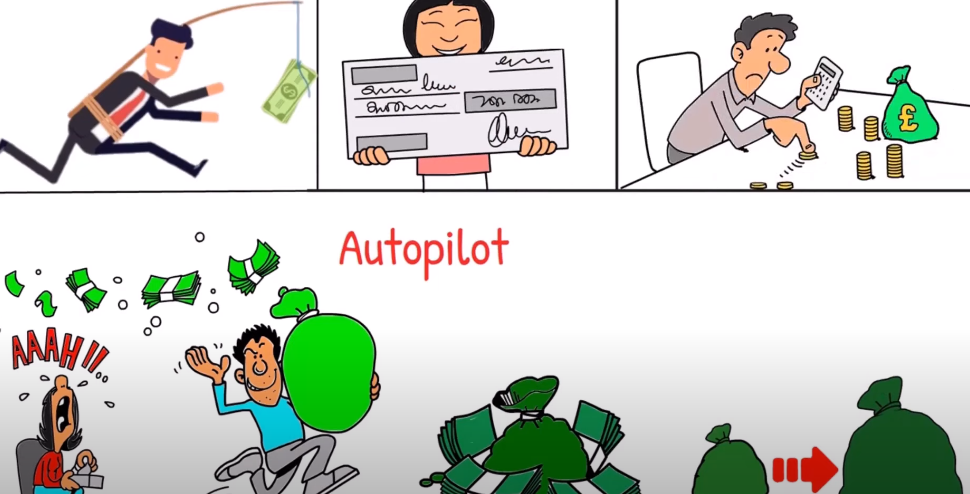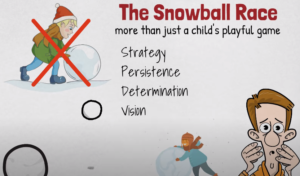Table of Contents
ToggleIntroduction
Are you an unwitting victim of money traps that rob you of your wealth, causing you to fall into the middle class red rush?
Failure to avoid these traps is detrimental to your financial health and can keep you dependent paycheck to paycheck. Many people operate on autopilot, unaware of the simple actions that are holding them back from creating the wealth they desire.
It seems like there’s never enough extra money, no matter how much you earn, to spend in a meaningful way, like investing for retirement or making an important purchase.
Avoiding these middle-class money traps, especially number one, will help you break out of the race so you can financially support the lifestyle you desire.
10. Not knowing what you’re invested in

Not knowing what you’re invested in can be a significant hurdle to creating the wealth you desire.
Learning the basics of investing is quite possibly the best thing you can do to ensure you have a comfortable retirement. Over time, the majority of your assets will be the result of interest on your investments.
To ensure you’re making the best investment selections for your unique scenario, it’s crucial to understand what you’re investing in and the pros and cons of different possibilities.
9. Actively trading

Actively trading, trying to outperform the market by purchasing speculative investments and buying and selling amid market fluctuations, is a poor approach. While experienced individuals like Warren Buffett and hedge fund manager Peter Lynch may outperform the market, for most, this is incredibly tough due to investing fees, taxes, and emotions working against them.
Timing the market by selling at the top and purchasing at the bottom is appealing but more difficult than it appears, often leading to a focus on short-term fluctuations rather than long-term goals.
8. Not tax planning

Tax planning can be a significant oversight, as taxes are typically your biggest expense. Focusing on your biggest expenditures, such as transportation and housing, is essential, but maximizing your tax status is equally important.
There are legal ways to lower the amount of tax you pay, including utilizing retirement accounts, taking advantage of tax advantages for real estate investments, and understanding how your income impacts your tax position.
Working with a CPA to maximize your tax position can result in keeping substantially more of your money.
7. Not making changes

Being unwilling to make changes can hinder significant progress. People often fear change because they want to be comfortable, but making small changes can enhance your circumstances.
Whether it’s moving to a less desirable area to free up money for the next phase, taking in a roommate to pay off debt or start a business, or seizing a new job opportunity, change is essential for growth.
6. Not buying a house
Not buying a house might mean missing out on one of the finest purchases you could make. While caution is advised, purchasing a house can enhance your finances in various ways.
Homeownership can lead to increased net worth as homeowners accumulate equity through mortgage payments and potential home value appreciation.
This asset could open up new opportunities in the future, and owning a property stabilizes housing expenditures over time.
These are critical steps to consider in your financial journey, each playing a vital role in building and preserving wealth.
5. Not Taking Risks

Not taking risks is a vital component of progress. Without it, you’ll be trapped in the same spot indefinitely. How can you expect to advance in life if you don’t take any risks?
To make a good decision, you must estimate the level of risk and reward. Whenever you wish to move forward, this might be in relation to finding a new job, changing occupations, or launching a business that is unlikely to succeed.
But if it succeeds, the benefits might be life-changing. Making such a significant change is undoubtedly dangerous. What happens if you don’t like it? What if the money isn’t exactly what you expected?
Risk exists wherever you invest your money, whether it’s in a property or cash. With the possibility of inflation, when accepting these risks, you may lessen the possible negatives by being prepared in case things don’t work out, such as having enough funds or a plan B.
4. Spending Money Before You Deserve
People frequently make the mistake of purchasing stuff or spending money on experiences because they believe they deserve it. They work hard; therefore, they ought to be rewarded, right?
There is some truth to this. Is it truly a prize if it sets you back to a place where you’re financially uncomfortable? When you start earning a decent wage, you might be tempted to buy a brand new automobile. It’s not a huge problem because you can finance it.
You may believe you deserve that flashy new automobile, but consider how much it will actually cost you.
Is it truly a reward for your work if you’re anxious about making payments, and it’s seriously limiting your capacity to accumulate wealth? Your future self is unlikely to agree.
3. Claiming You Don’t Care About Money

“I don’t care about money,” a poor individual could reply, stating they’re okay being broke and mistreated by an employer.
How can this be true when these same folks work 40 hours or more per week, 50 weeks per year, and bring home less than ideal pay?
Money now influences practically every aspect of people’s lives. They live in a house they can afford, not one they would select if money were not an issue. Of course, “I’m working.”
When someone says they don’t care about money, they imply they don’t care about having a lot of money from materialistic things.
It’s okay if you don’t care about being wealthy, but being concerned about money isn’t always a negative thing. After all, money has an impact on every aspect of our lives.
2. Keeping the Wrong Career
Students in high school are urged to pick a vocation that will keep them happily employed until retirement. As you can expect, this frequently leads to young individuals going into debt for a degree, only to discover that their profession was not what they had hoped for.
Either the pay isn’t what they were expecting or the work itself isn’t something they like. Many young individuals, on the other hand, escape the great pressure of choosing a better job path.
They may become trapped in low-paying employment that will not help them achieve their ambitions.
While making the best decision before deciding on a course of action is desirable, it seldom happens. That does not exclude you from adapting. What if you could change careers and make double, triple, or even four times your present salary?
Whether you want to start your own business or just change employment, you may accomplish it by developing an action plan with clearly defined goals and milestones.
1. Thinking None of These Will Work

Believing that none of these concepts will work for you is a mindset that will never enable you to advance. They may work for others, but they will not work for me. Since it may appear that you can’t get out of a hole, there are virtually always solutions based on your present situation.
This may not be what you want to hear, but the reality is that many of the people who claim none of these ideas work for them are reluctant to make the required sacrifices, make life adjustments, or take the necessary risks to improve their condition.
It may require discomfort or difficulty; building money is probably simpler for some than for others. But following these tips might lead to a better life. Which of these money traps do you fall into, and which are you willing to avoid to keep you entrenched in the middle class?
It is vital to detect these habits in order to make the necessary corrections. It does not need a huge paradigm shift in your life to produce your future prosperity. Start avoiding these harmful traps right now. You’ll be glad you did.








